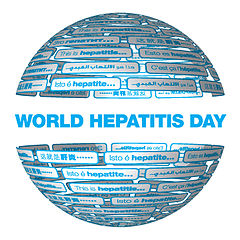
The final Saturday in July, the 28th, is World Hepatitis Day. Will County Health Department Epidemiology and Infectious Disease Coordinator Dr. Alpesh Patel says it is important to make blood screening for Hepatitis a regular part of your medical history. He says its most common form, Hepatitis C, “has been a silent epidemic throughout our country. So many people just do not know their status.”
Dr. Patel says as many as 500 to 600 Will County residents are now being diagnosed with Hepatitis C on an annual basis. He calls it “a good effort showing bad numbers.” Simply put, doctors and medical providers were not screening for Hepatitis C on a regular basis until recently. Therefore, many patients were walking around, and many still are, not knowing they have it. But through educational efforts by the Centers for Disease Control, more medical providers are being convinced to order the test if a patient’s status is not known, no matter how healthy they seem to be. As a result, a more realistic picture is being painted.
“We see the commercials out there,” Dr Patel stated. “And more providers are screening for a patient’s baseline level if their status is not known. Before, tests would be done before major medical procedures such as surgeries. But now it’s becoming more the norm for every patient.”
By “baseline level,” it is a question of whether or not the Hepatitis virus is in your body. As Dr. Patel explains, once it is there, it is there forever. “You have a foreign object in you that’s causing your system to produce antibodies. It becomes a constant battle between the virus and your immune system. Certain factors can cause the Hepatitis to become active: such as your health, your age, and your behavior.”
Another major factor once the Hepatitis virus is in your body, Dr. Patel pointed out, is use of alcohol. Hepatitis C is a virus that attacks the liver; and causes symptoms such as loss of appetite, nausea, vomiting, abdominal pain, joint pain, and jaundice. It can be transmitted from person to person through contact with blood from the affected party; especially through the sharing of contaminated needles or syringes. It can also be sexually transmitted, or passed to a newborn baby through an infected mother.
Hepatitis C is quite prevalent in those born during the “Baby Boomer” years, 1945 to 1965. Dr. Patel says a major reason for this is certain precautions that exist today were not around at that time. One example would be the screening of blood that is used for all transfusions.
“Today,” Dr. Patel said, “the screening of the blood is much better. You also had factors back then such as unsafe tattoo parlors, or even cases where health care workers dealing with blood were infected. And due to sexual and birth transmission, you had a lot of unknown situations where family and loved ones were affected.”
During the recent “69th World Health Assembly” in Geneva in May of 2016, an effort was announced to eliminate both Hepatitis B and C by the year 2030. (Hepatitis B is also transmitted by contaminated needles, sexually, or by birth. The much less common Hepatitis A can be transmitted by close person to person contact, or by the ingestion of contaminated food and drinks.) Is this realistic? Dr. Patel says it depends upon the efforts of doctors, the behavior of patients, and also the honesty of patients.
“A lot of times people might not be honest with their medical providers when asked about their number of sexual partners or drug use. For that reason, we should screen them. Any patient who does not have their baseline level Hepatitis test on record should have that blood test. It should be the norm for each and every patient.”
So for this year’s World Hepatitis Day, make a note to ask your doctor about the Hepatitis antibody blood test, to see if this battle is going on inside your body. For more information, you can go to these two websites, recommended by Will County Health Department Community Health Center Chief Medical Officer Dr. Jennifer Byrd: https://www.cdc.gov/hepatitis/resources/professionals/pdfs/abctable.pdf or https://www.cdc.gov/knowmorehepatitis/index.htm.
To hear additional discussion about Hepatitis, join Dr. Byrd on the 1340 WJOL Radio afternoon program with Kevin Kollins; Monday, July 23rd at 3:40 PM.

